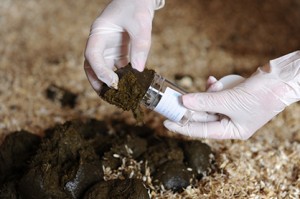Worms! Survey Shows More Than 1/3 of Horse Owners Don’t Conduct FWEC on Horses
A new survey showing that more than a third of horse owners never conduct faecal worm egg counts has prompted Zoetis to highlight the immense value of this method for worm control. A regular faecal worm egg count (FWEC) for every mature horse (> 3 years) during the summer months is the most efficient and cost-effective way to manage worm burdens during the grazing season, explain the company’s worming experts.
The British Riding Clubs Horse Health survey1, commissioned by Zoetis and conducted earlier this year, revealed that 36% of the 559 horse owners asked never conduct FWECs. In mature horses, a faecal worm egg count should be carried out every six to eight weeks during May to September to identify those that need dosing for redworm and those that don’t. FWECs indicate how many eggs each horse is contributing to the contamination of the pasture. Eggs hatch into worm larvae, so the higher the egg count the more larvae will be on the grazing – increasing the risks of re-infecting all the horses with worms.
Using the FWEC approach saves the cost of worming horses unnecessarily, while protecting the health of those that do and the efficacy of the wormers, by helping to slow resistance. The test can also help horse owners check that their wormer is working, if a FWEC is taken before and after administering a wormer. Over time, the frequency of FWECs may be able to be reduced for horses that are showing consistent egg shedding levels.
Regular FWECs during the summer, together with good pasture management, ideally poop-picking on a daily basis, will help to keep grazing as clean and worm-free as possible and horses healthy. It’s also important to weigh every horse before worming to make sure the correct dose is administered as under-dosing is a cause of resistance and the wormer may be less effective.
It’s important to understand though that a standard FWEC will not reliably identify tapeworm, encysted small redworm or bots. For these a licensed wormer needs to be used on a strategic basis. This is usually autumn and spring for tapeworm and late autumn/early winter for encysted small redworm. Foals and yearlings also benefit from regular FWECs, however the results need to be interpreted more cautiously and worming is likely to be required more frequently than in adults.
Zoetis Vet Wendy Talbot said. “The survey results are worrying, indicating that a high number of horse owners are still unaware of the most efficient and responsible way to control worms. It’s so important to discuss your worming program with your vet or a Suitably Qualified Person (SQP) to understand the role of FWECs and to make sure you choose the right methods and products for your horse’s circumstances.”
To find out more about year-round worm control visit www.wormingyourhorse.info. You can also download Stable Mate, the horse health management App from Zoetis. It is available from the iPhone App Store and Google Play Store: text Stable Mate to 80800 to download.
1The British Riding Clubs Horse Health Survey, commissioned by Zoetis, was completed online by 559 horse owners in the UK, during February 2014. The survey contained 21 questions on general horse health, care and management.
About Zoetis
Zoetis (zō-EH-tis) is the leading animal health company, dedicated to supporting its customers and their businesses. Building on more than 60 years of experience in animal health, Zoetis discovers, develops, manufactures and markets veterinary vaccines and medicines, complemented by diagnostic products and genetic tests and supported by a range of services. In 2013, the company generated annual revenues of $4.6 billion. With approximately 9,800 employees worldwide at the beginning of 2014, Zoetis has a local presence in approximately 70 countries, including 28 manufacturing facilities in 11 countries. Its products serve veterinarians, livestock producers and people who raise and care for farm and companion animals in 120 countries. For more information, visit www.zoetis.com.
Zoetis UK Ltd, Walton Oaks, Dorking Road, Walton-on-the-Hill, Tadworth, Surrey KT20 7NS











